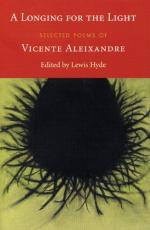|
This section contains 4,990 words (approx. 17 pages at 300 words per page) |

|
SOURCE: "Vicente Aleixandre: 'Límites y espejo,'" in The Poetics of Self-Consciousness: Twentieth-Century Spanish Poetry, Bucknell University Press, 1994, pp. 52-65.
In the following essay, which was originally published in Modern Language Notes in 1990, Mayhew explores Aleixandre's concern with the limitations of language as a tool for describing reality.
The image of Vicente Aleixandre as a relatively unsophisticated creator has been remarkably tenacious, although no one has ever called into question his mastery of language. The stylistic analyses of Carlos Bousoño, the author of the first and most influential monograph on the poet, have provided ample demonstration of the subtlety and power of Aleixandre's poetic technique. Still, few studies of his poetry have emphasized his linguistic self-consciousness, his awareness of the verbal medium as a theoretical problem. In a recent study, Philip Silver has given voice to the widespread view that Aleixandre is essentially naive as a...
|
This section contains 4,990 words (approx. 17 pages at 300 words per page) |

|


